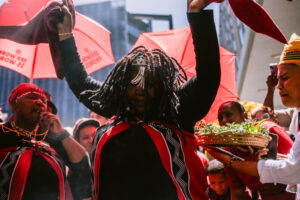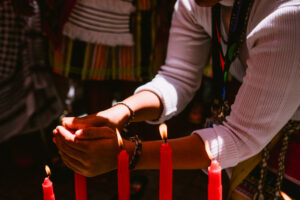How can we describe a gathering of globally marginalised people that, paradoxically, is organised in a way that reflects neocolonial dynamics? This may be the case with ILGA 2024.
Earlier in 2024, ILGA World announced its return to Africa after a 25-year absence, with the theme Kwa Umoja – We Rise—a slogan symbolising unity, resistance, and resilience. The queer community celebrated, thrilled by the prospect of Africa hosting once again and excited about the opportunity to spotlight and support the grassroots movements of South Africa. But beneath the surface, tensions were simmering. As the conference arrived on the African continent, the event mirrored the colonial past, creating divisions among local groups. The 31st ILGA World Conference was set to take place at a conference centre owned by a known Zionist in Century City—a space intentionally built to keep the poor out of view of the wealthy.
Mid-year 2024, local hosts Gender DynamiX and Iranti convened to discuss their vision for the conference and how the organising responsibilities would be shared between them. Triangle Project, another local organisation, was also present but appeared detached, not eager to join the effort.

We have been here before
This brought flashbacks to 2019 when Triangle Project had been the local hosting partner for the inaugural Global LBQ Conference hosted by COC Netherlands. At the time, Triangle had invited Gender DynamiX to join the local organising committee. After months of disagreements, Gender DynamiX withdrew, citing the conference’s failure to acknowledge that removing the ‘T’ from LBQ was inherently transphobic and that this decision exposed trans women and gender-diverse people to increased scrutiny and transphobic behaviour if they were to attend the Global LBQ Conference. While the intent behind the conference’s title was said not to have been malicious, it caused significant harm within both local and international organising spaces. In the months leading up to the event, the Global LBQ Conference PR team would issue multiple press releases to perform damage control and to explain their side of the controversy, none of which included them being transphobic.
Fast forward to 2024, after the ILGA World local hosts had met with other organisations, Triangle Project withdrew from supporting ILGA World, issuing a joint public statement with other NGOs like SWEAT. They declared their opposition to profit-driven conferences like ILGA World and announced their own alternative event, The Pavement Specials. This side conference, held at no cost to attendees, directly opposed ILGA World’s conference and aimed to offer a platform for inclusive resistance.
In the lead-up to the ILGA World Conference dates, the Pavement Specials invited the Executive Directors of Gender DynamiX and ILGA World to address pressing questions. Specifically, they demanded explanations for the steep $475 per-person cost of the ILGA World conference, which they argued was exclusionary to local activists. They also questioned ILGA World’s consultation process in determining said price and raised concerns about a bid from an ILGA World member organisation based in Israel being tabled for a ‘democratic’ vote to host the 2027 ILGA World Conference, at a time of Israel’s ongoing genocide against Palestinians and the war on Lebanon.

At the Pavement Specials teach-in on November 04, the Executive Director of ILGA Julia Ehrt and Gender DynamiX Executive Director Liberty Matthyse both accepted the invitation to speak at the teach-in, where they addressed the decision-making processes behind their respective organisations’ choices and actions. Julia apologised for the bid to host the next next ILGA world conference in Tel Aviv, Israel, having been put on the table. Ehrt’s reasoning at the time was that it was an oversight because ther thought process was to trust in the democratic processes of ILGA World, and believed that the bid would never have been accepted by the voting members of ILGA World.
During the conference, the Pavement Specials organised protests outside the Century City Conference Centre and hosted teach-ins at Triangle Project’s offices to engage the public with their message of resistance. Their programming created space for critical dialogue, exploring themes of sex-positivity, land acknowledgement, the politics of Pride, multiple film screenings and finally, they hosted a march to Parliament on the final day of the ILGA World Conference.
It is crucial to understand that The Pavement Specials did not position themselves as anti-ILGA World; rather, as I interpreted it, they used ILGA World as a platform to discuss the broader issues surrounding global conferences and international politics. They argued that if ILGA World is charging exorbitant fees to activists in South Africa and excluding the local community from meaningful participation in decision-making, then what about other international conferences held in the Global South? Are local activists and organising committees also being marginalised and treated as mere window-dressing for global agendas?
This quote from the Pavement Specials Manifesto may say it best:
“We are witnessing a pivotal moment. The surge of anti-gender movements and increased oppression demand a response that goes beyond traditional platforms. While conferences like ILGA World hold significance, they must evolve. Too often, spaces privilege the voices of the Global North, whether intentionally or not, excluding those who face the harshest realities. We must actively work to dismantle systems that favour elites, tokenism and overlook the most marginalised.”
Drawing from the experiences of the 2019 Global LBQ Conference and the 2024 ILGA World Conference, it is evident that local activists are increasingly frustrated with the political dynamics of international events. They are calling for accountability from the Global North and challenging the power imbalances that these countries and international organisations perpetuate in the Global South. The pressing question remains: How can we gather as activists in a way that is ethical, supports grassroots mobilisation, fosters international solidarity, and enables cross-continental conferencing—without exploiting and reinforcing colonial power imbalances?
Kim Windvogel is a queer who knows too much and loves writing about it. Author of They Called Me Queer & Touch: Sex, Sexuality & Sensuality. Writer and host of the SAFTA Nominated Documentary series, Sex & Pleasure, now streaming on Showmax. You can find them online @blazingnonbinary.
This piece is part of our African Feminist Takes from the 31st ILGA World Conference. Between 11 to 15 November 2024, the ILGA World Conference was hosted in Africa for the first time in 25 years in Cape Town, South Africa. The ILGA World Conference is the largest global gathering of LGBTIQA+ changemakers bringing together LGBTQIA+ human rights defenders and development experts, policy makers, international human rights mechanisms experts, researchers, journalists, funders, and allies worldwide.
The conference convened under the theme Kwa umoja we rise!, a mix of Swahili and English – “Kwa umoja” meaning “Together” or “In unity’’, came at a time when many African feminist and queer movements are dealing with ongoing anti-rights pushback. African LGBTQIA+ movements are actively advocating for social justice alongside other groups, yet they face specific, ongoing violence and discrimination, and they risk losing hard-won rights. More than most, they face an environment of scapegoating, making human rights efforts increasingly challenging. Despite these setbacks, there’s been some progress in some countries in recent years, underscoring the critical need for solidarity and collaboration across movements. In the face of violent opposition, building bridges and inclusive movements in the pursuit of justice and a better future for all is essential.
African Feminism – AF, with the support of the African Women’s Development Fund (AWDF), collaborated with African feminists to share their perspectives from the conference, stand in solidarity with and support queer liberation movements on the African continent. This collaboration is centered on amplifying voices and narratives through an intersectional lens, highlighting emerging issues and lived experiences, while enhancing resistance and feminist consciousness.
The African Women’s Development Fund (AWDF) stands at the heart of Africa’s feminist movement as a transformative feminist fund dedicated to resourcing, nurturing, and strengthening women’s rights initiatives and feminist movements across the continent. As an active partner and fierce champion for gender justice, AWDF supports organisations to build sustainable foundations while creating lasting, systemic change across Africa.

That’s a ludicrous conference fee. It not only excludes most grassroots activists, but the vast majority of academic working on relevant issues, particularly those in disciplines without funding from associated industries. That’s like 10 times the cost of an ordinary academic conference in the Humanities.